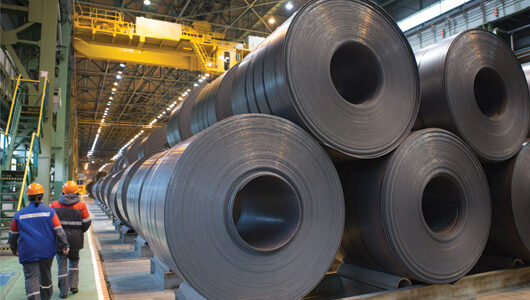
Metinvest Mining and Metallurgical Group increased its exports of steel products to Poland by about 16% year-on-year in 2023 to over 800 thousand tons from about 700 thousand tons in 2022.
According to Yulia Mezentseva, Head of Logistics at Metinvest Polska, in an interview with the leading Polish publication Puls Biznesu, the increase in cargo traffic is facilitated by the unblocking of routes, but transshipment in ports and border crossings remain bottlenecks.
It is also noted that despite the war, Metinvest is expanding its operations in the Polish market.
“2023 was slightly better for us than the previous year. There were no more congestion and queues on the Polish railway network, which contributed to an increase in transportation efficiency. Compared to the previous year, we recorded a 16% increase in tonnage. We transported a total of 1.9 million tons through Polish ports and railways, of which about 1.3 million were steel products, 378 thousand were iron ore and 237 thousand were coking coal,” Mezentseva stated.
Out of the total volume of products delivered from Ukraine to Poland, 939 thousand tons were exported to other countries through Polish ports.
“The coal needed for our steel plants in Ukraine was also transshipped in Polish ports,” the manager said.
Some of the goods brought from Ukraine to Poland were delivered by rail or truck to Germany, the Czech Republic, Italy, Slovakia, and other countries.
Mezentseva clarifies that iron ore used to dominate the structure of supplies from Ukraine, but now it is mainly steel products that are imported. According to the country’s Metallurgical Chamber of Commerce and Industry, Ukraine is the largest non-EU steel supplier to Poland.
The head of logistics at Metinvest Polska predicts that in 2024, Metinvest will at least maintain and perhaps even slightly increase the volume of supplies of some goods to the Polish market. It assumes that their structure will change, especially the volume of steel imported from Ukraine.
For their part, local producers fear that if demand in Poland starts to grow, Ukrainian steel will flood our market. Przemyslaw Sztuchkowski, president of Cognor, even suggests introducing limits on the supply of steel products from Ukraine to the EU. The idea is to allow free transit through Poland to other countries and to ensure that the volume of imports on the Polish market does not threaten the stable operation of Polish producers.
At the same time, Mezentseva states. “In 2021, 1.2 million tons of our steel products were sold directly to the Polish market, 0.7 million tons in the previous year, and 0.8 million tons in 2023. Due to the war, we have limited opportunities to grow production and supplies,” she notes.
In addition, she draws attention to the problems with the transportation of goods across the Polish-Ukrainian border and transshipment in ports, which impede supplies to our market and transit by sea.
“The Polish-Ukrainian agreement stipulates that six trains a day with steel and ore should pass through the wide gauge at the Medyka border crossing. In practice, three or four are allowed through, as the Polish border and railroad administrations give priority to other transport. Therefore, we often have to wait for a long time at the border, which increases our costs. For every hour of downtime, we have to pay CHF 1.9 per commercial wagon,” says Mezentseva.
She suggests that one of the reasons for the long queues at the border could be the recent protests by Polish carriers and farmers.
“The queue on the Ukrainian side sometimes reached 70 kilometers. In the case of delicate goods that needed to be delivered quickly to customers, we sometimes decided to change modes of transportation and transfer goods from cars to trains to avoid standing in a very long line,” says the manager.
She hopes that the suspension of the protests will facilitate uninterrupted transportation by road and rail. She emphasizes that after crossing the border, transportation through Poland is quite efficient.
“In 2022, we often had to wait on the access roads, but now PKP PLK has significantly improved the capacity of the roads leading to the ports,” says Mezentseva, adding that access to the terminals is almost hassle-free, but there are difficulties with transshipment.
“Bulk cargo, such as iron ore and coal, is transshipped much faster than steel products. Transshipment in Polish ports is four times slower than at Black Sea terminals,” Mezentseva said.
According to her, one of the reasons for this may be the lack of staff at the terminals.
The Metinvest representative also points out that Polish customs regulations do not take into account changes in the weight of bulk cargo during transit. However, they can occur, for example, due to weather conditions. Therefore, employees of transportation and transshipment companies have to spend a lot of time during inspections explaining that coal or ore may weigh a little more in rainy weather. There may also be so-called natural losses during transportation.
“Railroad rules allow a certain percentage of deterioration for different groups of goods. Customs rules, on the other hand, do not allow any losses that are subject to individual inspection by the service. For us, this means significant losses,” emphasizes Mezentseva.
Metinvest Group notes that it is interested in building long-term business relations in the Polish market.
“We are talking about challenges, but we are ready to work out solutions together with the Polish side. We want to simplify procedures and transportation,” adds the Head of Logistics at Metinvest Polska.
“Metinvest is a vertically integrated group of steel and mining companies. The group’s enterprises are located mainly in Donetsk, Luhansk, Zaporizhzhia and Dnipro regions.
The main shareholders of the holding are SCM Group (71.24%) and Smart Holding (23.76%), which jointly manage it. Metinvest Holding LLC is the management company of Metinvest Group.